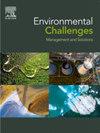The futures market for water rights trading in California: Analyzing the emergence of a controversial experiment
Q2 Environmental Science
引用次数: 0
Abstract
This paper presents a qualitative case study of the world's first water futures contract in California, a market that enables hedgers and speculators to bet on water prices. It is attempted to explain which factors shaped the emergence of the unique market by applying the Political Process Inherent Dynamics Approach (PIDA), an analytical framework from the field of environmental policy analysis. In addition, the topics of heated debate that have surrounded the new market are summarized and contextualized. To obtain the relevant information, expert interviews, complemented by online sources, were subjected to a Qualitative Content Analysis. It is concluded that the launch of the contract is an extreme case of private business actors shaping water governance, made possible by a longstanding market philosophy in the US, that gives leeway for actors of financialization to create facts. In the political-administrative realm, a lack of accountability and will to interfere seems to prevail. However, nongovernmental organizations (NGOs) and other actors have led efforts to abolish the market, criticizing water futures in ways that resonate with broader debates about privatization and food futures.

加州水权交易的期货市场:分析一个有争议的实验的出现
本文提出了世界上第一个水期货合约的定性案例研究,该合约在加利福尼亚,使对冲者和投机者能够押注水价。它试图通过应用政治过程内在动力学方法(PIDA)来解释哪些因素形成了独特市场的出现,PIDA是环境政策分析领域的分析框架。此外,对围绕新市场的激烈争论的话题进行了总结和背景化。为了获得相关信息,专家访谈,辅以在线资源,进行了定性内容分析。结论是,该合同的启动是私营企业行为者塑造水治理的一个极端案例,这是美国长期存在的市场哲学所促成的,这为金融化行为者创造事实提供了余地。在政治-行政领域,缺乏问责制和干涉意愿似乎占上风。然而,非政府组织(ngo)和其他行动者带头努力废除市场,批评水期货的方式与更广泛的关于私有化和粮食期货的辩论产生共鸣。
本文章由计算机程序翻译,如有差异,请以英文原文为准。
求助全文
约1分钟内获得全文
求助全文
来源期刊

Environmental Challenges
Environmental Science-Environmental Engineering
CiteScore
8.00
自引率
0.00%
发文量
249
审稿时长
8 weeks
 求助内容:
求助内容: 应助结果提醒方式:
应助结果提醒方式:


